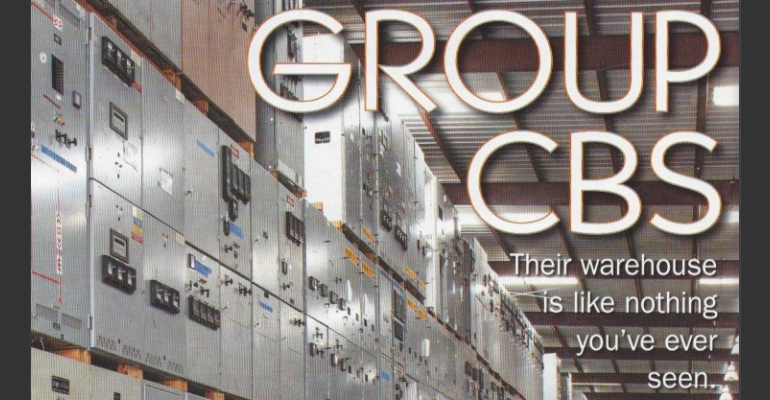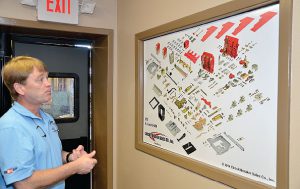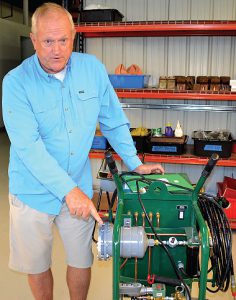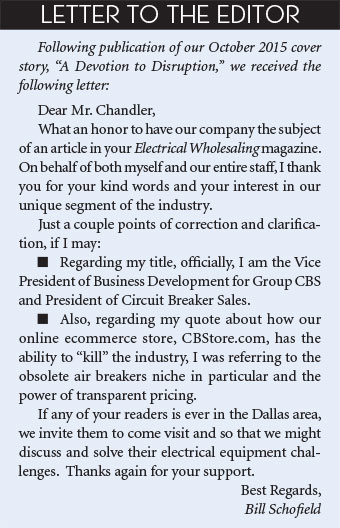
Investments in research and systems and a willingness to embrace the market’s changes show why Group CBS may be the most interesting business in the electrical industry.
Oct 1, 2015 Doug Chandler | EWWEB
Bill Schofield is taking a huge chance. He has made the decision to take a risk and the ball is rolling, one that will significantly affect his business and may change the entire segment of the industry he’s part of. He’s excited, but also wary.
Schofield, president, runs Group CBS, Gainesville, Texas, a company that is no stranger to making waves. It has thrived and grown over 34 years on the controversial margins of the electrical industry, buying, refurbishing, remanufacturing and reselling used and surplus electrical equipment. That end of the market is still reviled publicly by most manufacturers and traditional distributors, characterized as a haven of dusty warehouses stacked with dark piles of dangerous junk sold with a wink. But most of those manufacturers and distributors do business with him, Schofield says.
A visit to the Circuit Breaker Sales (CBS) warehouse in Gainesville quickly dispels the myths about surplus dealers. Here, at least, is a warehouse as organized, conspicuously clean, well-lit and well operated as you’ll find in the best traditional distributors. But instead of aisles of cardboard boxes and conduit racks and wire spools you see an astonishing collection of large circuit breakers and switchgear and their component parts — every brand ever made in the United States, almost every configuration, going back to World War II.
 Since he merged his company Astro Power Systems (now Astro Controls) with CBS 18 years ago, Schofield has moved to make CBS as professional as possible — certifications under ISO 9000 and ISO 14000, founding membership in the Professional Electrical Apparatus Recyclers League (PEARL), board seat on the Remanufacturing Industries Council (RIC), active participation in the interNational Electrical Testing Association (NETA), National Electrical Manufacturers Association (NEMA), pretty much any industry group that will have him — and to advance the cause of making safe, tested, reliable legacy equipment accepted in the electrical industry.
Since he merged his company Astro Power Systems (now Astro Controls) with CBS 18 years ago, Schofield has moved to make CBS as professional as possible — certifications under ISO 9000 and ISO 14000, founding membership in the Professional Electrical Apparatus Recyclers League (PEARL), board seat on the Remanufacturing Industries Council (RIC), active participation in the interNational Electrical Testing Association (NETA), National Electrical Manufacturers Association (NEMA), pretty much any industry group that will have him — and to advance the cause of making safe, tested, reliable legacy equipment accepted in the electrical industry.
“If you were to ask the entire industry about CBS, they’d say, ‘goddamn their stuff’s expensive,’ but nobody would badmouth the stuff. They would say they didn’t like the price, or they didn’t like dealing with me, but they would never ever complain about the product that leaves here, and that’s our greatest salvation,” Schofield says.
Just off the aisles of the warehouse you see a mix of work stations and machinery where people are disassembling, cleaning, testing and reassembling air frame breakers, vacuum breakers, oil breakers, switchgear and other equipment Schofield and his team have recently purchased. Old names abound — Allis Chalmers, Federal Pacific, ITE — along with all the current brands.
Schofield’s work with the RIC, which is dominated by automotive parts remanufacturing businesses but includes remanufacturers from a huge variety of markets, changed his thinking on the distinctions often hazily drawn between remanufacturing, reconditioning and refurbishing. “I learned that remanufacturing is actually setting the odometer back to zero. It’s not just guaranteeing another 10,000 miles,” he said.
“Having new doesn’t make sense to a lot of people,” Schofield says. “Sometimes it’s a safety issue. At a lot of these facilities their guys have been working on the same equipment for 20 years. If you bring in the new stuff, you can’t just replace everything, so now suddenly there’s this new oddball they have to learn to work with and it affects the rest of the system. In a big plant you want interchangeability. That’s how Southwest Airlines succeeds, they use all the same aircraft. That way you can train all your guys on the same parts, you can buy tires in bulk. It’s more efficient, and safer.”
On a tour of the warehouse he points to a pallet of old relays. “After Hurricane Sandy we sold $250,000 worth of these because they don’t want the new ones. The old guys want the old ones, the new guys want the new, fancy ones. But you know, you can dance to 8-track. You don’t need MP4.”
The historical values of American manufacturing are never far from Schofield’s thinking. “They built this stuff to last 40 years. They made it out of heavy steel, with parts that can be serviced and replaced.”
Schofield has recently begun to rethink his product offerings in a way that might seem insane to a more traditional distributor. An insight inspired by a box of crayons. “I made the argument in the industry that I had every crayon Crayola ever made. We came to find out we didn’t have every crayon. We had 50 burnt siennas and 100 blacks but we didn’t have purple-chartreuse or whatever in there. That caused us to start thinking differently because we want to be the true supermarket of this category.” As a result, the warehouse now has a large number of empty bins marked for components they don’t have. Some are on order from manufacturers, some they’ll get as parts off larger systems they find to buy, some can be made by converting related products.
Along this path, Circuit Breaker Sales has established a position that has few if any equals as the keeper of deep knowledge about old circuit breakers and switchgear and their components.
“What we sell isn’t really stuff, it’s information,” he says. He points out that at a lot of the manufacturers in the industry, there just isn’t anyone on staff anymore who can answer questions or even identify the equipment the company sold decades ago. CBS on the other hand has hands-on knowledge of every component, every configuration, and more importantly, the testing protocols and performance parameters of equipment from every manufacturer. They have developed testing protocols of their own and participated in developing industry standards.
Adding to this store of information, the company over the past decade has bought defunct circuit breaker manufacturers Federal Pacific and ITE, giving the company ownership of the historical catalogs and other intellectual property.
All of which highlights the stakes in the decision that Schofield has been worrying over. He’s preparing to put all his information online, available to the public. Including prices.
CBS has been working through the equipment in its warehouse, coding and tracking and loading data into its new Epicor software system. They buy product data from Trade Service, but it’s incomplete and many of the products in the warehouse were built before there were enterprise resource planning systems to put data into. Some even predate part numbers. CBS creates its own part numbers and SKU sets where it needs to, and makes all the inventory data available on a company-wide network. Increasingly, it’s loading that data into its public e-commerce website cbstore.com.
Not only are they putting the data online, they have a person devoted to making high-definition photographs of every single component of every kind of equipment they have. Those images go into the store, but they’re also used to build dramatic exploded-equipment graphics showing every part in place. Schofield got the idea on a tour of a Ford Motor plant in Dearborn, Mich., where he saw on the wall a graphic of a Ford Escort with each component of the car exploded to show all the parts. Once those images are done, he’ll make them available in poster size to service shops and other customers. More importantly, users who visit the Circuit Breaker Store site can view them, zoom in and click on each part and go immediately to details, specs, availability and pricing and a seamless process for purchasing the part. Out of convenience, he expects most visitors to go ahead and buy the part from him, but there’s nothing stopping them from using his site for research and then buying it elsewhere.
“When I fully release this, I have the power to kill the entire industry because I will set the prices. That’s why we haven’t done it, to be honest with you, because once I do this, it changes the world. Not necessarily in a good way,” Schofield says. “It’s good in that it gives people access to stuff, and I’ll sell a bunch of stuff, but it’s bad in that once I say that part is $845, that is now the highest you can get for that part, no matter what the situation. That’s the negative.”
Beyond the planned upgrades to its online store, CBS also plans to introduce mobile apps for breaker selection and parts identification (and of course purchasing).
The risks of changing the market for legacy electrical equipment may be daunting, but a willingness to take risks is a fundamental part of what makes Group CBS what it is.
 Finley Ledbetter grabs a Sharpie and starts drawing on a stainless steel table top, describing a curve of failure probabilities in the life of a vacuum circuit interrupter. From the marks at the edge of the table you can tell he does this frequently. In the first year after rolling off the assembly line, a certain number of the vacuum bottles will fail due to some defect. Then most of them see many years of flawless service, which Ledbetter has determined is approximately 29 years. At the end of that time, the curve of failures goes back up.
Finley Ledbetter grabs a Sharpie and starts drawing on a stainless steel table top, describing a curve of failure probabilities in the life of a vacuum circuit interrupter. From the marks at the edge of the table you can tell he does this frequently. In the first year after rolling off the assembly line, a certain number of the vacuum bottles will fail due to some defect. Then most of them see many years of flawless service, which Ledbetter has determined is approximately 29 years. At the end of that time, the curve of failures goes back up.
Failing vacuum interrupters pose a problem for a company selling legacy vacuum circuit breakers because there was no easy way to test the integrity of the vacuum and identify the potential for early failure. You could test the breaker, it would work fine, and you could sell it and it might fail the next day. Bothered by the prospect of selling an unsafe product, Ledbetter set to work, looking for a way to test and confirm the condition of the vacuum. It took 15 years of hard work, but Ledbetter created a non-invasive coil tester that could be used in the field to determine which vacuums were likely to fail by detecting the presence of oxygen inside the bottle.
This kind of puzzle drives Group CBS’s “skunk works” operations, a team of engineers led by Ledbetter. After an early career ranging from engineering stints at Megger and Shermco to professional drag racing, it was Ledbetter and partner Ray Kinney, a fellow Shermco veteran, who started Group CBS in the 1980s. Since bringing in Schofield to run the business side Ledbetter, as CEO and chief scientist, has been able to concentrate more of his time on the long-term research and development projects that are his passion.
“We identify problems, and then we come up with a way to solve them. That can take a long time,” Ledbetter says. “You don’t bill for this. One-third of the solutions we come up with don’t make it to market. Two-thirds of our research work has no revenue potential at all.”
But the times when this R&D work does pay off can pay off big. A lot of vacuum interrupters in circuit breakers and reclosers installed in substations and distribution circuits throughout North America are nearing 40 years of service. Now Group CBS, through its subsidiary Vacuum Interrupters Inc., based in Dallas, has a product transmission and distribution companies can use to field test the vacuums and guide their replacement programs.
Another big win from the skunk works spun off a manufacturing company, CBS ArcSafe, also based in the Dallas area. It began with Ledbetter’s response to a fatal accident that happened when a worker racking a large circuit breaker caused a deadly arc flash explosion.
 Spinning off new businesses from its core of supplying legacy circuit breakers and switchgear is a key part of how Group CBS works.
Spinning off new businesses from its core of supplying legacy circuit breakers and switchgear is a key part of how Group CBS works.
“I wanted to make a tool that would keep that from happening, if they’re smart enough to use it,” Ledbetter says. ArcSafe began by making remote racking systems that allow technicians to unrack and rerack circuit breakers on live equipment from a safe distance – up to 300 ft with the wireless controls. It has now expanded with a device for remotely actuating large switchgear. The ingenuity of both includes the simple ways they can be configured to operate the mind-boggling variety of switch geometries and interfaces that have been used over the years, and magnetic attachment points that eliminate the need for modifications or bolt-on brackets.
They have expanded into services, including CBS Nuclear, Charlotte, N.C., an Appendix B certified service company that specializes in nuclear power plants, and field service company Western Electrical Services, Phoenix.
Astro Controls, also in the Dallas area, is a separate surplus operation that buys, reconditions, services, tests and sells lower-voltage molded case circuit breakers and other equipment, a far more competitive market than CBS’s concentration on medium- and high-voltage gear.
With their unusual devotion to innovation, including investment in long-term research to drive new product development, and a willingness to make moves that could change the ground on which their businesses stand, Ledbetter, Schofield and the Group CBS crew offer a very different take on the electrical market, one where endless disruption and advocacy of the lasting value of well-built American equipment makes taking big chances a pretty solid bet.
Read the Article at Electrical Wholesaling
Click to download.

